新概念一册45课
新概念英语lesson45-46(共28页)课件

Listening
Listen to the tape, and then answer the questions.
1.Where is Pamela ? 2.Who are talking? 3.Can Pamela type the letter
for her boss ? Why?
Grammar
某人做某事 Ask him to read this newspaper. 让她读一下这份报纸。
terrible adj.糟糕的,可怕的
It’s a terrible day! 可以指心情,天气,相貌,味道等 I feel terrible! Oh, my god! She looks terrible!!! The Japanese food is terrible! The movie is terrible! horrible [‘hɔrəbl] adj. 恐怖的,毛骨悚然的
2. I can fly. 3. She can not do the homework. 4. We can not use the computer.
1. 你能帮我吗? 2. 你踢足球吗? 3. 他们会游泳吗? 4. 他会唱歌吗? 1. Can you help me ?
2. Can you play football ? 3. Can they swim ? 4. Can he sing songs ?
It is a love letter for you, my dear. My handwriting is very good.
Wang Xizhi’s handwriting is good.
My handwriting is terrible.
新概念一第45课
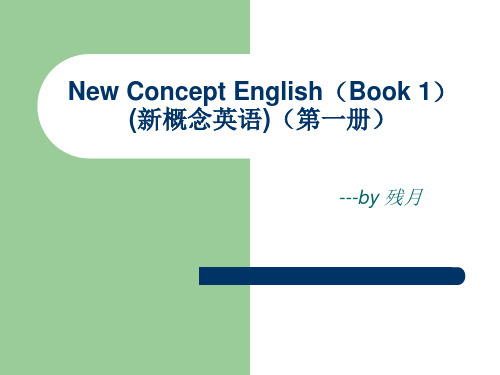
★terrible adj. 糟糕的,可怕的
(1)糟糕的 1)-How are you today? -Terrible! 2)-How do you like the movie? 你觉得那部电影如何?
-It’s terrible! How do you like + sth 你觉得…如何?
(2)可怕的 She is a terrible woman. terrible weather 糟糕的天气 She is terrible at maths. 她的数学很蹩脚。 He is good at maths. 他擅长数学。
老板的书写太糟糕了! 名词 n. 1.书写;手写 2.笔迹;笔法
Is that signature in your handwriting? 那个签名是你的笔迹吗? 3.【古】手抄文件,手稿 sign
neat homework; neat handwriting. 整洁的家庭作业;工整的书法。
Yes? What's the matter?
PAMELA: I can't type this letter.
I can't read it!
The boss's handwriting is terrible!
Listen to the tape, and then answer the questions.
be nice to sb. 对某人很好 Our boss is nice to us. 我们老板对我们很好。
Your boss is your boss just because he (she ) has a larger vocabulary than you have .
新概念英语lesson45-46(共12页)课件

Lesson46 Can you…?
1. They are typing these letters. 2. She is making the bed. 3. You are swimming across the
数阅
学读
使使
人人
精充
细实
;;
博会
物谈
使使
人人
深敏
沉捷
;;
You made my day!
伦 理 使 人 庄 重 ; 逻 辑 与 修 辞 使 人 善 辩 。
写 作 与 笔 记 使 人 精 确 ; 史 鉴 使 人 明 智 ; 诗
歌
使
人
巧
慧
;
我们,还在路上……
Lesson45 The boss’s letter.
Pamela: Bob! Bob: Yes? What’s Байду номын сангаасhe matter? Pamela: I can’t type this letter.
I can’t read it. The boss’s handwriting is terrible.
Can you and Sam listen to the radio? Yes, we can. What can you do? We can listen to the radio.
Lesson46 Can you…?
1. Can you type this letter? 2. Can Penny wait for the bus? 3. Can Penny and Jane wash the
新概念英语一册第45课课件
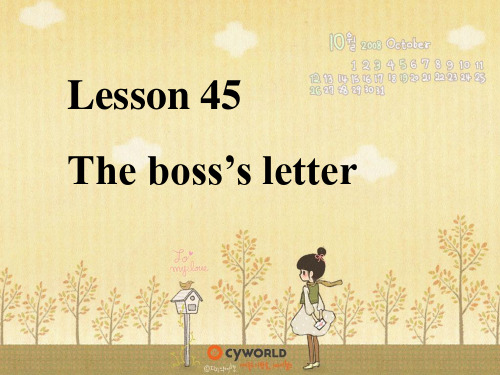
I can not speak English. 我不会煮晚饭。
I can not cook dinner.
can的句型结构 1. 疑问句
can+主语+动词原形~? 你会说英语吗?
Can you speak English ? 你会煮晚饭?
Can you cook dinner ?
Can she type this letter for me? / kæn ʃi: taip ðis 'letə fɔ: mi: /
I can’t type this letter. / ai kænt taip ðis 'letə /
I can’t read it. / ai kænt ri:d it /
Aand this room?
B: He can paint this bookcase, but he can’t paint this room.
A: _____lift this table and that chair ? B: ______lift that chair, ______ lift this table?
THE BOSS: Where’s Pamela? BOB: She’s next door.
She’s in her office, sir.
THE BOSS: Can she type this letter for me?
Ask her, please. BOB: Yes, sir.
A: Can you put your coat on? B: No, I can’t. A: Can you put your hat on? B: Yes, I can.
新概念英语第一册第45课Lesson45课
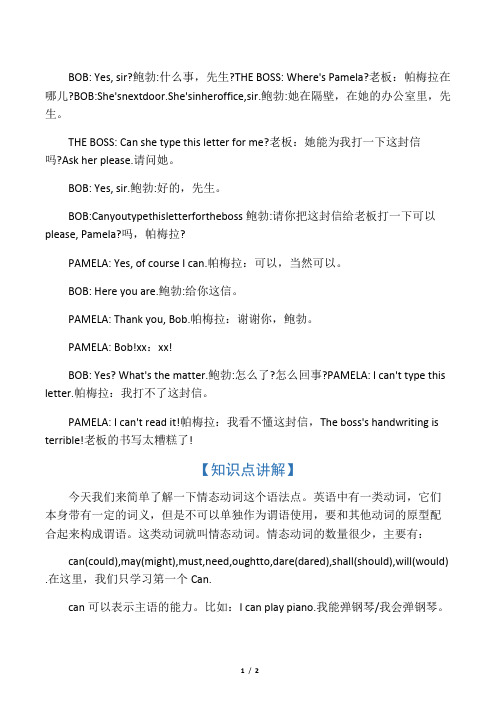
BOB: Yes, sir?鲍勃:什么事,先生?THE BOSS: Where's Pamela?老板:帕梅拉在哪儿?BOB:She'snextdoor.She'sinheroffice,sir.鲍勃:她在隔壁,在她的办公室里,先生。
THE BOSS: Can she type this letter for me?老板:她能为我打一下这封信吗?Ask her please.请问她。
BOB: Yes, sir.鲍勃:好的,先生。
BOB:Canyoutypethisletterfortheboss鲍勃:请你把这封信给老板打一下可以please, Pamela?吗,帕梅拉?PAMELA: Yes, of course I can.帕梅拉:可以,当然可以。
BOB: Here you are.鲍勃:给你这信。
PAMELA: Thank you, Bob.帕梅拉:谢谢你,鲍勃。
PAMELA: Bob!xx:xx!BOB: Yes? What's the matter.鲍勃:怎么了?怎么回事?PAMELA: I can't type this letter.帕梅拉:我打不了这封信。
PAMELA: I can't read it!帕梅拉:我看不懂这封信,The boss's handwriting is terrible!老板的书写太糟糕了!【知识点讲解】今天我们来简单了解一下情态动词这个语法点。
英语中有一类动词,它们本身带有一定的词义,但是不可以单独作为谓语使用,要和其他动词的原型配合起来构成谓语。
这类动词就叫情态动词。
情态动词的数量很少,主要有:can(could),may(might),must,need,oughtto,dare(dared),shall(should),will(would) .在这里,我们只学习第一个Can.can可以表示主语的能力。
新概念英语单词第一册第45课:老板的信
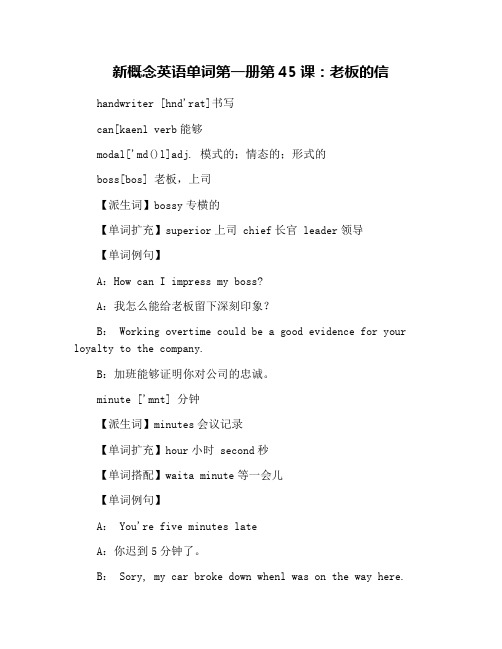
新概念英语单词第一册第45课:老板的信handwriter [hnd'rat]书写can[kaenl verb能够modal['md()l]adj. 模式的;情态的;形式的boss[bos]•老板,上司【派生词】bossy专横的【单词扩充】superior上司 chief长官 leader领导【单词例句】A:How can I impress my boss?A:我怎么能给老板留下深刻印象?B: Working overtime could be a good evidence for your loyalty to the company.B:加班能够证明你对公司的忠诚。
minute ['mnt] 分钟【派生词】minutes会议记录【单词扩充】hour小时 second秒【单词搭配】waita minute等一会儿【单词例句】A: You're five minutes lateA:你迟到5分钟了。
B: Sory, my car broke down whenl was on the way here.B:对不起,我的车在来这儿的路上坏了。
ask [ɑsk] v请求,要求【单词扩充】require要求request请求,要求 demand要求【单词搭配】ask a question问问题 ask for要求 ask the way闯路【单词例句】A: CanI get there in twenty minutes?A: 20分钟能到那儿吗?B: Maybe you need to ask the driver to take some short cuts.B:也许你得要求司机尽量抄近路。
terrible['terb()l] •adj.糟糕的可怕的【单词扩充】horrible糟透的【单词例句】A: Your performance is so terrible.A:你的表现太糟糕了。
新概念英语第一册第45课课文

新概念英语第一册第45课课文Lesson 45 - A faithful servantMr. and Mrs. Brown were a wealthy couple who lived in a large mansion in the countryside. They had a faithful servant named John, who had been with them for over twenty years. John was not only diligent and hardworking, but also extremely loyal to the Browns.One day, Mrs. Brown fell seriously ill and had to be hospitalized. Mr. Brown was devastated and spent most of his time by his wife's side, leaving the mansion unattended. Realizing the vulnerability of the situation, John took it upon himself to ensure the security of the house and take care of all the daily chores.Despite the long hours and the enormous responsibility, John managed to keep the mansion running smoothly. He would wake up early in the morning, clean the house, water the plants, and even cook meals for Mr. Brown. He made sure that everything was in order and that the household continued to function seamlessly.During this challenging time, John's devotion to the Browns became even more apparent. He would visit Mrs. Brown at the hospital regularly, bringing her flowers and uplifting herspirits with his cheerful presence. He also handled all the administrative tasks, paying bills, managing finances, and attending to the needs of the staff.After months of dedicated service, Mrs. Brown finally recovered and returned home. Upon seeing the impeccable condition of the mansion and experiencing the exceptional care and attention that John had provided, she was overwhelmed with gratitude. She couldn't help but praise John for his unwavering loyalty and dedication.Mr. Brown, too, was deeply moved by John's commitment. He decided to reward John's loyalty by giving him a generous bonus and a well-deserved vacation. John was grateful for their appreciation and humbly accepted their gestures.From that day forward, the bond between the Browns and John grew even stronger. The couple realized that they could always rely on John, not only as a servant but as a trusted friend. John continued to serve them faithfully for many more years, knowing that his loyalty and hard work were genuinely appreciated.In this story, we see the importance of loyalty and dedication in maintaining strong relationships. John's unwavering commitment to his employers not only helped themduring their time of need but also strengthened the bond between them. It serves as a reminder that acts of loyalty and service can make a profound impact on the lives of others.。
新概念英语单词第一册第45课:老板

新概念英语单词第一册第45课:老板的信handwriter [hnd'rat]书写can[kaenl verb能够modal['md()l]adj.模式的;情态的;形式的boss[bos]•老板,上司【派生词】bossy专横的【单词扩充】superior上司chief长官leader领导【单词例句】A:How can I impress my boss?A:我怎么能给老板留下深刻印象?B:Working overtime could be a good evidence for yourloyalty to the company.B:加班能够证明你对公司的忠诚。
minute ['mnt]分钟【派生词】minutes会议记录【单词扩充】hour小时second秒【单词搭配】waita minute等一会儿【单词例句】A:You're five minutes lateA:你迟到5分钟了。
B:Sory, my car broke down whenl was on the way here.B:对不起,我的车在来这儿的路上坏了。
ask [ɑsk] v请求,要求【单词扩充】require要求request请求,要求demand要求【单词搭配】ask a question问问题ask for要求ask the way闯路【单词例句】A:CanI get there in twenty minutes?A:20分钟能到那儿吗?B:Maybe you need to ask the driver to take some shortcuts.B:也许你得要求司机尽量抄近路。
terrible['terb()l] •adj.糟糕的可怕的【单词扩充】horrible糟透的【单词例句】A:Your performance is so terrible.A:你的表现太糟糕了。
新概念课文第一册第45课内容

新概念课文第一册第45课内容The Content of Lesson 45 in New Concept English Book 1Lesson 45 in the first volume of the New Concept English textbook introduces the topic of "Acceptance." In this lesson, we learn about the importance of accepting the reality of certain situations and adapting to them with a positive attitude. The story revolves around a man named John who faces various challenges while living in a foreign country. Through his experiences, we are encouraged to embrace change and make the best out of any situation. This article will explore the content of Lesson 45 and provide further insights and analysis.John is a foreigner who moved to a new country to pursue his career and expand his horizons. However, he faces numerous difficulties and struggles to adapt to the local cultural norms and language. As a result, he feels isolated and disheartened. One day, while he was walking through a marketplace, a friendly local woman approaches him and tries to strike up a conversation. Despite not understanding her language, John appreciates her effort and accepts her friendly gesture. This encounter becomes a turning point in John's attitude. He realizes that instead of resisting the cultural differences, he should embrace them and learn from them.From this point on, John starts to actively participate in the local community. He attends language classes and tries to learn the local language. He actively engages with the locals and seeks opportunities to immerse himself in the culture. Through his efforts, he gradually starts to understand the customs and traditions of the country. He realizes that accepting andadapting to a new environment not only helps in building relationships but also allows for personal growth and development.The lesson also emphasizes the importance of accepting the limitations and obstacles in life. John faces numerous challenges in his professional life, including difficulties at work and a language barrier. However, instead of succumbing to frustration, he learns to accept the situation and focuses on improving his skills. He seeks guidance from his colleagues and embraces constructive feedback. This attitude earns him respect and support from his peers, and he eventually overcomes the obstacles that hindered his progress.Furthermore, Lesson 45 underscores the significance of having a positive mindset when faced with setbacks. John encounters setbacks throughout his journey, but he does not let them discourage him. He views them as opportunities for personal growth and learns valuable lessons from each experience. By accepting the reality of his situation and maintaining a positive outlook, John becomes resilient and is able to overcome challenges with determination.The content of Lesson 45 in the New Concept English textbook teaches us the value of acceptance in various aspects of life. By accepting cultural differences, personal limitations, and setbacks, we can foster personal growth and build strong relationships. Through John's story, we are reminded that acceptance is not only about acknowledging the reality of our surroundings but also about embracing it with a positive and open mind.In conclusion, Lesson 45 of the New Concept English Book 1 introduces the theme of acceptance. Through the story of John, we learn about the importance of accepting cultural differences, personal limitations, andsetbacks with a positive attitude. By embracing change and adapting to new environments, we can experience personal growth and overcome challenges. Lesson 45 serves as a valuable reminder that acceptance is a vital tool for success in various contexts of life.。
L45(新概念一册45课)
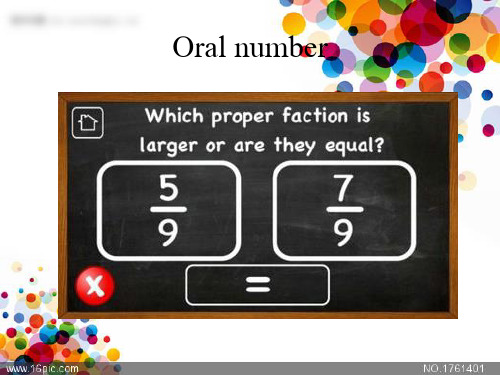
你能帮我吗? 你踢足球吗? 他们会游泳吗?
他会唱歌吗?
Can you help me?
Can you play football?
Can they swim? Can he sing?
Text
• 1. the boss’s letter (读音) • ’s 的名词所有格 • 表所有关系 • 名+’s “…的”
Can I ask for some food?
If you have any questions, please let me know.
handwritting 书写
terrible adj.糟糕的,可怕的
可以指心情,天气,相貌,味道等 It’s a terrrible day! I feel terrible. Oh, my god! She looks terrible!!! The japanese food is terrible!
否定句---主语+can +not+V原 I can not speak English. I can not cook dinner.
Can 句型结构
Can 的句型结构 1. 疑问句
Can +主语+V原~?
你会说英语吗?
Can you speak English?
你会煮晚饭吗? Can you cook dinner ?
能,会 将…装入密封罐 罐头
boss 老板 bossy 专横的,爱指挥人的
You are the boss. minute 分钟,一会儿 时间单位 Year, month,day, hour, minute,second 形容时间短
ask 问,请求,要求
新概念一第45课

I’ll be back in a minute. I’ll be back in no time! 相似表达: a moment [‘məumənt] 片刻
Wait a moment, please!请稍等一下。 Just a பைடு நூலகம்oment! 就一会儿。
ppt课件
11
★ handwriting 书写 hand(手)+ writing(写) very clear handwriting 非常清晰的字迹 His handwriting is bad. 他的字迹潦草。
Can you make the tea? Can you be my girl-friend? 过去式could, 表请求时,语气更委婉些 Could you help me, please?
ppt课件
6
★ boss n. 老板,上司
boss’s 老板的
He is my boss.他是我的老板。
ask sb for sth 向某人要… ask me for some help
ppt课件
10
★minute n. 分(钟)
a minute/ one minute 一分钟;一会儿 minute 可数 复数缩写mins
时间单位:century decade year, season,month, week, day, hour, minute, second daily
1. You are amazing! 你太棒了!
2. You rule!
你太牛了!
3. I gotta leave/go! 我得走了~
gotta [’ɡɔtə] 1. 〈美俚〉必须; = got to
ppt课件
新概念第一册第45、46课
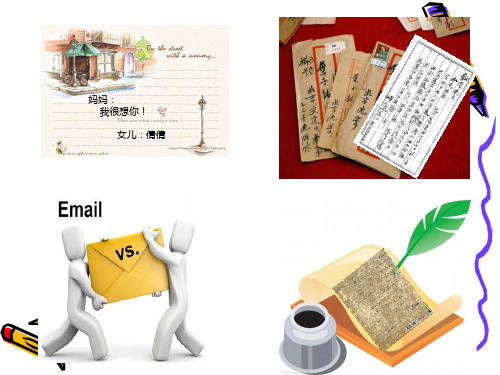
can
① 表示能力;能,会 我能说英语。 I can speak English. 她会唱歌。 She can sing.
② 表示可能 她可能会看见Tony. She can meet Tony.
③ 表示允许;许可 你可以走了。 You can go. 你可以进来. You can come in.
• 该句型中的特殊疑问词常用what, where, when等一般用肯定陈述句作答。
• What can you do? • What can they do?
1. 我会打字。 2. 她不会做作业。 3. 你能帮我吗?
1. I can type. 2. She can not do the homework. 3. Can you help me?
I can not cook dinner.
can的句型结构 一般疑问句: Can+主语+动词原形+其他? 你会说英语吗? Can you speak English ? 你会煮晚饭? Can you cook dinner ?
can的句型结构 • 特殊疑问句:
特殊疑问词+can+主语+动词原形+其它?
THE BOSS: Can she type this letter for me? Ask her please. BOB: Yes, sir.
Can you type this letter for the boss please, Pamela? PAMELA: Yes, of course I can.
妈妈: 我很想你!
女儿:倩倩
Lesson 45 The boss’s letter
New wordse my friend?
lesson 45-46 新概念一册教师用课件全(吐血制作)

尾字母非s的复数名 词的所有格
•结构: 特殊变化名词复数+’s 如: the children’s
尾字母为s的复数 结构: 名词所有格
名词的复数+’
如: the girls’ dog
口诀总结
1.单数变所有’s手 牵手,
2.复数变所有加不 加s仔细瞅.
•以y结尾的把变为ie加 th 发音[iѲ]
•如: eightieth
口诀
基变序有规律,th后边去.
1.2.3特殊记尾字母tdd.
8去t, 9去e, ve 要用f替.
几十几十用心记, ieth把y 代替.
序数词表”第几…”时前 面一般加定冠词the
如: the first boy
the second room 序数词都可缩写.
Lesson 46
• Exercise a. • B.
பைடு நூலகம்充单词
•China •Japan
•n. •中国
•n. •日本
•Finland •n. •芬兰
•Finnish •adj.&n. •芬兰的; •芬兰人
•India •n. •印度
•Indian •adj.&n. •印度的; •印度人
Thanks!
Lesson 45-46 The boss’s letter
•terrible
lift vt.
•adj.糟糕的; 举,抬,拿起:
可怕的
现在分词
他书写糟透了.你能抬起一
His
百磅的砂糖
handwriting is ~.
吗?
•cake •n.饼;蛋糕 •月饼
新概念第一册45原文
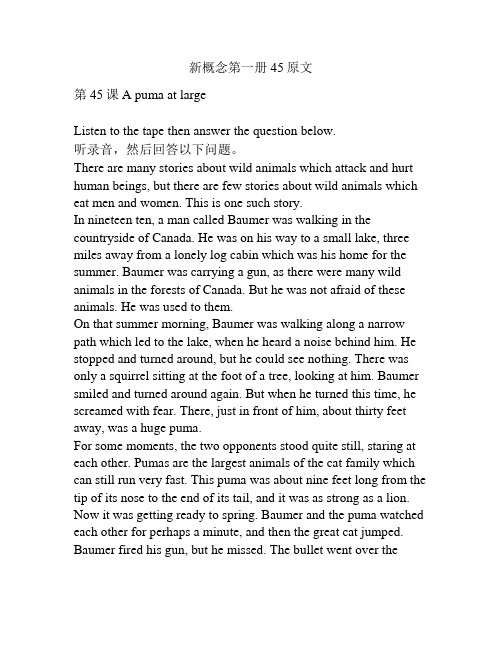
新概念第一册45原文第45课 A puma at largeListen to the tape then answer the question below.听录音,然后回答以下问题。
There are many stories about wild animals which attack and hurt human beings, but there are few stories about wild animals which eat men and women. This is one such story.In nineteen ten, a man called Baumer was walking in the countryside of Canada. He was on his way to a small lake, three miles away from a lonely log cabin which was his home for the summer. Baumer was carrying a gun, as there were many wild animals in the forests of Canada. But he was not afraid of these animals. He was used to them.On that summer morning, Baumer was walking along a narrow path which led to the lake, when he heard a noise behind him. He stopped and turned around, but he could see nothing. There was only a squirrel sitting at the foot of a tree, looking at him. Baumer smiled and turned around again. But when he turned this time, he screamed with fear. There, just in front of him, about thirty feet away, was a huge puma.For some moments, the two opponents stood quite still, staring at each other. Pumas are the largest animals of the cat family which can still run very fast. This puma was about nine feet long from the tip of its nose to the end of its tail, and it was as strong as a lion. Now it was getting ready to spring. Baumer and the puma watched each other for perhaps a minute, and then the great cat jumped. Baumer fired his gun, but he missed. The bullet went over thepuma's back and it landed on Baumer's chest. In a moment, the man was dead.。
新概念英语一册课后练习答案(Lessons 45-46)
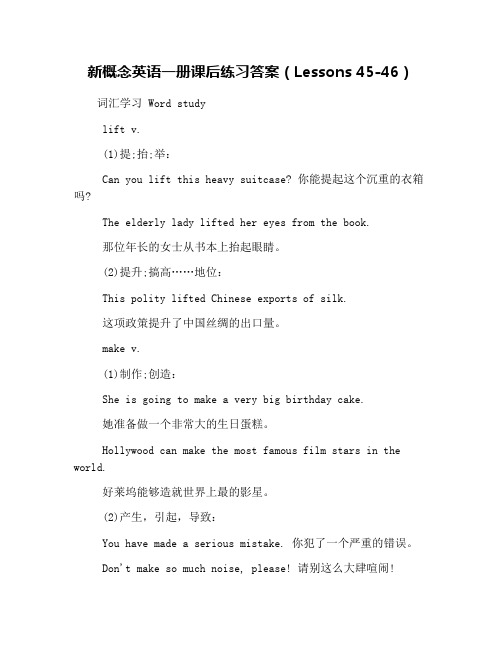
新概念英语一册课后练习答案(Lessons 45-46)词汇学习 Word studylift v.(1)提;抬;举:Can you lift this heavy suitcase? 你能提起这个沉重的衣箱吗?The elderly lady lifted her eyes from the book.那位年长的女士从书本上抬起眼睛。
(2)提升;搞高……地位:This polity lifted Chinese exports of silk.这项政策提升了中国丝绸的出口量。
make v.(1)制作;创造:She is going to make a very big birthday cake.她准备做一个非常大的生日蛋糕。
Hollywood can make the most famous film stars in the world.好莱坞能够造就世界上最的影星。
(2)产生,引起,导致:You have made a serious mistake. 你犯了一个严重的错误。
Don't make so much noise, please! 请别这么大肆喧闹!(3)整理;料理;准备:She is now making the bed for a guest. 她现在正为客人铺床。
The coffee is made. 咖啡煮好了。
terrible adj.(1)可怕的;骇人的:This is a picture of terrible new weapons.这是一张可怕的新式武器的图片。
(2)困难的;费劲的:Who can accomplish this terrible task? 谁能完成这项艰难的任务?(3)极度的;非常严重的:I've got a terrible headache. 我头疼得厉害。
(4)糟透的;很蹩脚的:She is terrible at maths. 她的数学很蹩脚。
新概念课文第一册第45课内容
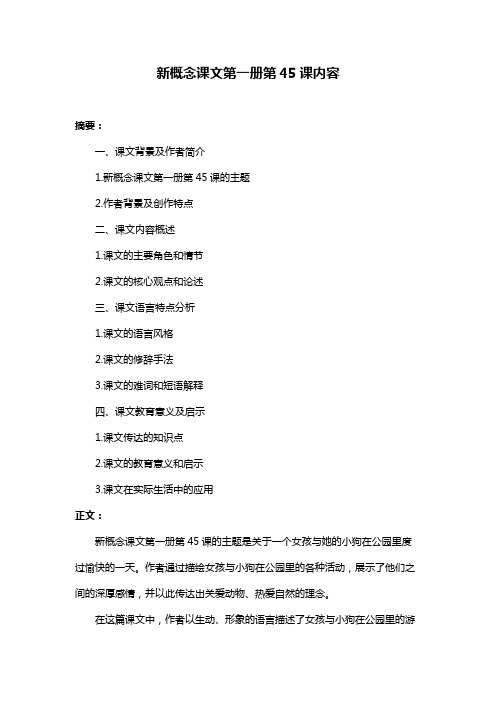
新概念课文第一册第45课内容摘要:一、课文背景及作者简介1.新概念课文第一册第45课的主题2.作者背景及创作特点二、课文内容概述1.课文的主要角色和情节2.课文的核心观点和论述三、课文语言特点分析1.课文的语言风格2.课文的修辞手法3.课文的难词和短语解释四、课文教育意义及启示1.课文传达的知识点2.课文的教育意义和启示3.课文在实际生活中的应用正文:新概念课文第一册第45课的主题是关于一个女孩与她的小狗在公园里度过愉快的一天。
作者通过描绘女孩与小狗在公园里的各种活动,展示了他们之间的深厚感情,并以此传达出关爱动物、热爱自然的理念。
在这篇课文中,作者以生动、形象的语言描述了女孩与小狗在公园里的游玩过程,如“小女孩带着小狗在草地上奔跑,阳光洒在他们身上,显得格外快乐。
”等。
同时,作者还通过对话形式展示了女孩与小狗之间的互动,如“女孩问:‘你累了吗?’小狗摇摇尾巴,表示自己并不累。
”等。
这些描述使得课文内容丰富,让读者能够更好地理解女孩与小狗之间的感情。
在课文中,作者运用了许多修辞手法,如拟人、比喻等,使文章更具表现力。
例如,在描述小狗跑得快时,作者写道:“小狗像一阵风一样跑得飞快。
”这样的比喻既生动又形象,让读者更容易感受到小狗奔跑的速度。
这篇课文的教育意义主要体现在关爱动物、热爱自然方面。
通过女孩与小狗在公园里的愉快经历,课文传达了我们要关爱动物、保护环境,与自然和谐共处的观念。
此外,课文还可以启发读者学会关爱他人、珍惜友谊,如女孩对小狗的关心和照顾,以及他们之间深厚的感情。
Lesson45+The+boss’s+letter(课件)新概念英语第一册

The boss’s letter
_Ca_n_ you c_o_m_e_ here a minute please, Bob? Yes, sir?
_W_h_e_r_e_’s_ Pamela? _S_h_e’_s_ next door. _S_h_e_’s_ in her office, sir. _Ca_n_ she t_y_p_e_ this letter for me? A__sk_ her please. Yes, sir. _Ca_n_ you t_y_p_e_this letter for the boss please, Pamela? Yes, of course I _ca_n_.
can的否定形式: can+ not = can’t
情态动词:表示说话人对一个动作的感情、态度,认为
“可能”,“应当”,“必须”等等。
情态动词+动词原形
一、根据句意填空。 1. Can you come here a m__in_u_t_e please? 2. I can’t read this letter. The boss’s _ha_n_d_w_r_it_i_ng_
is terrible.
二、根据汉语提示填空。 1. Can you come here a m__in_u_t_e(分钟) please? 2. Who is _n_e_x_t _d_o_or_(在隔壁)? 3. She can t_y_p_e_(打字) this letter. 4. The water is t_e_r_r_ib_le_(可怕的). 5. Pamela is in her_o_ff_i_ce_(办公室).
She’s next door. She’s in her office, sir. _Ca_n_ she type this letter for me? A_s_k_ her please. Yes, sir. _C_a_n you type this letter for the _b_o_ss_ please, Pamela?
(完整版)新概念一册45课
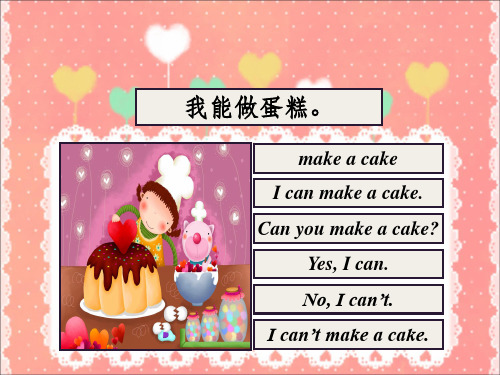
Can you _c_o_m__e_h_e_r_e_a__m_i_n_u_te_ please, Bob? Yes, sir? Where’s Pamela? She’s_n_e_x_t__d_o_o_r_. She’s in _h_e_r_office. Can she t_y_p_e_this letter for_m_e_? Ask _h_e_r please. Yes ,sir. Can you type this letter for _th_e__b_o_s_s please, Pamela. Yes o_f_c_o_u_r_s_e_ can. Here you _a_r_e. Thank you, Bob. Bob! Yes? What’s the matter? I _c_a_n_’t_ type this letter. I _c_a_n_’t_ read it. The _b_o_s_s_’s__ handwriting is _te_r_r_ib_l_e__.
任务四
模仿朗读课文。无错误和停顿并 且语音语调相似的队获胜。
两队各派一名代表进行猜拳,失败的队先进行游戏。
Boss: Can you come here a minute please, Bob? Bob: Yes, sir?
1.a minute 在本文中怎样翻译? A. 一会儿 B. 一分钟 C. 一小时 2. yes?应读成什么音调? A. 升调 B. 降调 C. 前升后降 3. yes?怎样翻译? A. 是的。 B. 什么事? C. 不是。
任务二
每组选出四个单词,读熟后,进 行“今天单词有什么?”的游戏。 停止次数少的组获胜。
新概念一册45课

Boss: Where’s Pamela? Bob: She’s next door.
Bob: She’s in her office, sir.
1.Where对什么提问? A. 时间 B. 地点 C. 人物 2. next door怎样翻译? A.下一个门 B.隔壁 C.门后
3. next door是什么地方?
任务六
每队选出若干名同学在黑板上写 出你所听到的句子,错误少的队 获胜。
获胜的组优先选择试题。
1
2
3
4
5
6
用动词的适当形式填空 1.Tim can _sw__i_m_ (swim), he iss_w__im__m__i_n_g(swim) now. 2.My mother can’t _ty_p__e (type) a letter,
A. her office B. her bedroom C. her kitchen
Boss: Can she type this letter for me? Boss: Ask her please. Bob: Yes, sir.
1.for后面加人称什么代词? A. 主格 B. 宾格 C. 形物代 2. Ask her please.是什么句型? A.省略句 B.否定句 C.祈使句
Yes, she can. No, she can’t. She can’t put on her coat.
我们能游泳。
swim We can swim. Can you swim? Yes, we can. No, we can’t. We can’t swim.
Lesson 45 The boss’s letter
boss’s中’s的含义是什么 ? A. is B. 所有格 C. 复数
- 1、下载文档前请自行甄别文档内容的完整性,平台不提供额外的编辑、内容补充、找答案等附加服务。
- 2、"仅部分预览"的文档,不可在线预览部分如存在完整性等问题,可反馈申请退款(可完整预览的文档不适用该条件!)。
- 3、如文档侵犯您的权益,请联系客服反馈,我们会尽快为您处理(人工客服工作时间:9:00-18:30)。
Can you type this letter for the boss please, Pamela?
Yes, of course I can.
/'ɔ:təm/
/nekst/
/a:sk/
/'wIntə/ /’hænd,raItIŋ/ /'terəbl/
/bDs/
/'ɔ:təm/ autumn
n. 秋天
/'wIntə/
winter
n. 冬天
/bDs/ boss n.老板
/nekst/ next
adj.下一个
next door
隔壁
/a:sk/ ask
v.问
/'mInIt/
minute
n.分钟
a minute 一分钟 一会儿
two minutes 两分钟
/’hænd,raItIŋ/
handwriting
n. 书法、笔迹 /'terəbl/ terrible adj. 糟糕的
任务二
每组选出四个单词,读熟后,进 行“今天单词有什么?”的游戏。 停止次数少的组获胜。
我能做蛋糕。
make a cake I can make a cake. Can you make a cake? Yes, I can. No, I can’t. I can’t make a cake.
她能穿衣服。
put on her coat She can put on her coat. Can she put on her coat? Yes, she can. No, she can’t. She can’t put on her coat.
我们能游泳。
swim We can swim. Can you swim? Yes, we can. No, we can’t. We can’t swim.
Lesson 45 The Βιβλιοθήκη oss’s letter任务一
找出本课所有单词中的元音音标。
获胜的队在下一轮比赛中将享有优先选择权。
/'mInIt/
Here you are. Thank you, Bob.
of course 的两个同义词是什么? sure ———————— certainly
————————
Bob! Yes? What’s the matter?
What’s the matter?(同义句) wrong What’s _______? up What’s _______?
任务六
每队选出若干名同学在黑板上写 出你所听到的句子,错误少的队 获胜。
获胜的组优先选择试题。
1
2
3
4
5
6
用动词的适当形式填空
1.Tim can _____ _________ (swim) now. swim (swim), he is swimming
type (type) a letter, 2.My mother can’t ____
minute next
n. 分钟 adj.下一个的 v.问
ask boss
autumn winter handwriting
n. 老板
n.秋天 n.冬天 n.书法,笔迹 adj.糟糕的
terrible
/'pæmIlə/
Pamela
/bDb/
Bob
任务四
模仿朗读课文。无错误和停顿并 且语音语调相似的队获胜。
两队各派一名代表进行猜拳,失败的队先进行游戏。
Boss: Can you come here a minute please, Bob?
Bob: Yes, sir?
1.a minute 在本文中怎样翻译? A. 一会儿 B. 一分钟 C. 一小时 2. yes?应读成什么音调?
A. 升调 B. 降调 C. 前升后降
由上一轮比赛中获胜的队优先选择单词。失 败的队先进行游戏。
minute 1
autumn 5
next
ask
2
3
winter 6 handwriting 7 terrible8
boss
4
任务三
两个队把任务二中的单词交换, 再次进行“今天单词有什么?” 的游戏。停止次数少的组获胜。
由上一轮比赛中失败的队先进行游戏。
I can’t type this letter.
I can’t read it!
The boss’s handwriting is terrible!
boss’s中’s的含义是什么 ?
A. is B. 所有格 C. 复数
Can you _________________ come here a minute please, Bob? Yes, sir? Where’s Pamela? She’s__________. next door She’s in ____office. her Can she type ____this letter for___? me Ask ___ her please. Yes ,sir. Can you type this letter for _______ the boss please, Pamela. course can. Yes of ________ Here you ___. are Thank you, Bob. Bob! Yes? What’s the matter? can’t type this letter. I _____ I _____ can’t read it. The _______ boss’s handwriting is ________. terrible
He is going to walk ____.(walk) 5.Penny is making _______(make) the tea, Sam can’t___(do) this. do
3. yes?怎样翻译? A. 是的。 B. 什么事? C. 不是。
Boss: Where’s Pamela? Bob: She’s next door. Bob: She’s in her office, sir.
1.Where对什么提问?
A. 时间 B. 地点 C. 人物
2. next door怎样翻译? A.下一个门 B.隔壁 C.门后 3. next door是什么地方?
she is going to write ____ (write) it. 3.Can you ____ lift (lift) this case for me? Sorry, I can’t ___ lift (lift) it.
going ( go) to do? 4.What is your brother _____
A. her office B. her bedroom
C. her kitchen
Boss: Can she type this letter for me? Boss: Ask her please. Bob: Yes, sir.
1.for后面加人称什么代词?
A. 主格 B. 宾格 C. 形物代
